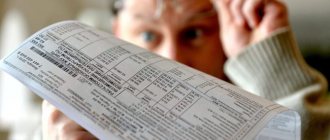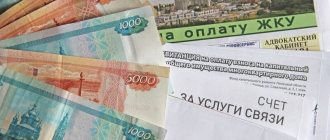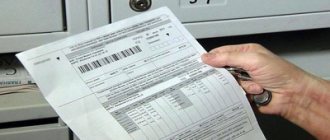The legislative framework
Legislation on the procedure for calculating payments for the provision of housing and communal services
The procedure for paying for the maintenance of living space and the use of housing and communal services is based on two codes of Russia: Housing and Civil.
The first determines the system of utility charges, their size and the legal obligations of homeowners.
Based on the second, cases of the emergence of the right to own residential premises are determined, as well as the period from which the obligation to pay for the maintenance of real estate appears.
According to Article 153 of the Housing Code, owners of residential premises are obliged to pay for their maintenance and utilities on time and in full.
In the Housing Code you can find the following:
- what charges are legal (Article 154);
- what payment rules are established by law (Article 155);
- what amount of payment and form is acceptable (Articles 156 - 157);
- what expenses are required to be borne by property owners in apartment buildings (Article 158);
- who can count on what benefits and subsidies when paying for housing and communal services (Articles 159-160).
Questions related to the payment of utility bills in the absence of registered ones in the apartment most often arise among new owners of residential premises, after:
- equity participation in the construction of new housing and before registration of its ownership;
- acquiring or obtaining additional living space in which no one lives;
- moving from old housing and canceling registration in it.
The grounds after which the obligation to maintain real estate passes to the new owner are also described in Article 153:
- the owner is burdened with these obligations from the date of registration of the right indicated in the certificate of ownership of real estate (Civil Code of the Russian Federation, Art. 219);
- employers, from the moment of execution of the rental agreement (Civil Code of the Russian Federation, Chapter 34);
- tenants, from the moment of execution of the lease agreement (Civil Code of the Russian Federation, Chapter 35);
- owners of premises received from developers - after drawing up a transfer and acceptance certificate (Civil Code of the Russian Federation, Art. 556);
- participants of residential cooperatives from the date of provision of the property (RF Housing Code Art. 124).
From the moment the owner of a residential premises moves into it or becomes the owner by law, he is obliged to bear the costs of maintaining the apartment, regardless of whether anyone is registered there or not. It also doesn’t matter whether the premises are residential or temporarily empty.
If the premises are located in an apartment building, the owner is required to pay for the maintenance and repair of common property in the part determined by his share.
How to deposit money
Every apartment owner should know how to pay utilities for their home. For non-payment or late payments, penalties are imposed on the owner of the premises. Only timely payment of funds for services supplied by utility companies can guarantee the uninterrupted supply of these services to a person.
ATTENTION! Late or incorrect payment for housing and communal services may lead to their suspension for the consumer.
The owner of the apartment pays for the utilities himself, even if the premises are rented out. All details must be specified in the lease agreement.
The deadline for making payments under the Housing Code must be made by the 10th day of each month. Representatives of management companies are required to provide the apartment owner with the appropriate receipts to repay the amount for the use of housing and communal services.
The legislation does not exempt the apartment owner from paying utility bills, even if he does not live in the home.
However, not all services will be charged.
The procedure for paying off a utility bill is very simple, but some people still wonder how to do it correctly . Payments are made in cash or by bank transfer.
Before depositing money, you must review the receipt. To avoid fines, payment should be made after receiving a notice with the prescribed amount.
You can pay for utilities at post offices, banks, or directly at the supplying organization. You can deposit funds into the account of supplying companies by bank transfer using ATMs, electronic payment systems, and mobile payments. This method of depositing funds is relevant for young people who understand modern technologies.
You can make a payment in cash using the terminal. The device is similar in appearance to an ATM, and payment is made by depositing funds into a special acceptor for banknotes. This method of paying off utility bills saves people from queuing at the box office.
After completing the procedure, the person will receive a check from the terminal, which should not be thrown away, because it serves as confirmation in case of disputes.
Payment for housing and communal services if no one is registered in the apartment
Do I need to pay utility bills if no one is registered in the apartment?
What utility bills must the apartment owner pay? In order for there to be grounds for non-payment of bills for a particular service, logical reasoning is not enough; a legal framework is necessary.
Accruals
To understand which services are mandatory for payment, and when the owner has the right not to pay for housing and communal services, you should understand the resource accounting system and the necessary costs for maintaining real estate, as well as the structure of billing to citizens.
The services for which property owners are billed can be divided into:
- ensuring comfortable living for citizens;
- aimed at ensuring the functioning of the premises and its safety.
Some of them can be calculated based on the area of the room, and some based on the number of users. In the absence of meters, charges for gas, sewerage, electricity and water supply are made based on the number registered.
Services can be personal and general, payment for which is distributed evenly among all users.
Services, without the provision of which the premises will become unusable or unfit for habitation, must be paid for by the owners, regardless of registration and presence in the premises.
These include:
- current and major repairs;
- maintenance of premises (payment of rent);
- heating fee.
You can stop accruing other services by law, and some of them by agreement with the management company or the chairman of the HOA.
Services that can be refused at the level of management companies and HOAs include cleaning and beautification of the local area. And also a fee for additional services.
These include payment for parking, common antenna, security, etc. If these services are provided to each apartment automatically, you must refuse them in writing to the management company or HOA.
Each apartment will be billed monthly for gas, electricity, sewerage, hot and cold water.
Payment for these services can be suspended if no one really uses them. Or reduce it if, despite the fact that no one is registered in the apartment, people live in it or are carrying out repair work.
Payment exemption procedure
Suppliers, as well as the management company, housing maintenance office are not interested in exempting citizens from paying for the provided utility services, therefore the person who is the owner of the property must put a requirement before these enterprises. The main condition is that the owner does not live in the apartment.
To do this, it is recommended to proceed as follows:
- Request from the contractor a written justification for the accrued amounts of utility bills. The supplier is obliged to provide a written response with reference to the law. This will allow the apartment owner to determine which and to whom utility bills will have to be paid indisputably, and which ones can be reduced or completely exempted from payment.
- Submit to the supplier official papers that confirm state registration or actual residence at another address where the owner of the property makes the required utility payments.
A written request and documents attached to the application will be a legal basis for the supplier to recalculate the amounts due for payment. The legal basis will be Government Decree No. 354 of May 2011. The document regulates the provision of utilities in an apartment building. It says that the temporary absence of residents in an apartment (and this is 5 or more calendar days in a row) that is not equipped with metering devices obliges the supplier to recalculate the billed utility bills. However, every rule has its exceptions.
The approach is the same here, so the following must be paid:
- expenses incurred by the supplier for heating housing located in a multi-storey residential building;
- gas supply used for home heating.
Important! Before recalculating amounts for water disposal (sewerage), the supplier must recalculate payments billed for water supply. The volume of consumed water used for general house needs is not subject to recalculation.
If this procedure was not followed and recalculation was not made, the only way to resolve the dispute is to file a claim. However, to do this, you should enlist the support of an experienced lawyer or practicing attorney. These specialists will advise you on the prospects, and will also help you draw up all the necessary papers in a legally competent manner. If necessary, they can represent your interests in court.
Public utilities
What are utilities and how are they calculated?
If no one is registered in the apartment, what is the housing and communal services fee? If there are no meters, it is also possible to stop paying for services intended for the convenience of living.
In this case, it is necessary to prove that no one lives in the apartment and, accordingly, does not use the resources. You can do this in several ways:
- Disable resource access to the premises if its owner lives at a different address and no one else lives in the apartment.
- Suspend accruals temporarily for the period of absence, documenting it.
In both cases, you should contact the housing company with an application and a document proving ownership of the property. If the owner of the apartment is registered in another place where he pays for utilities, he should provide a certificate of registration and receipts for payment of resources at the place of residence.
Invoices for garbage removal at the location of the apartment in which no one lives or is registered will be sent automatically.
It is not possible to cancel these accruals upon application. This can only be done by proving that this service is paid for by the citizen in another place, that is, at the place of actual registration.
It is impossible to stop charging for heating and turn it off under any circumstances. The only option to reduce the bill occurs if the heating source is located in the apartment, and it is possible to adjust the heating temperature.
Minimum values will allow you to pay less. Complete shutdown of equipment in winter is impossible, as it will damage the overall heating system and the entire building.
Often, disputes regarding payment for housing and communal services arise during shared construction during a period when the apartment has already been transferred to the owner, but a certificate of ownership has not yet been received. Owners of such apartments should remember that in their case, the law establishes the obligation to pay for the maintenance of the apartment from the moment the property is transferred.
The date of occurrence of obligations is considered to be the date of the transfer deed signed by the apartment owner and the developer. Until this document is signed, the burden of paying for housing and communal services is borne by the developer.
The situation with the owner
Payments for utilities and rent for private property begin to be calculated from the moment a citizen registers ownership rights to it.
It is worth noting the fact that, in accordance with current legislation, even in the case of the temporary absence of the owner in the specified premises, it is not possible to recalculate payment for such services as:
- Current repairs and maintenance of the building
- Using the elevator
- Providing centralized heating
It is worth noting that in the case of purchasing an apartment or some other real estate, other conditions may be established under which rent will be paid. In this case, responsibility for the timeliness of utility payments lies directly with the owner of the premises or each person who has a share in the property in accordance with their part. This rule is established by Article 210 of the Civil Code.
Payment for utilities is carried out in accordance with the data received in a separate receipt. In order to divide personal bills for the use of housing and communal services, owners can contact directly the employees of their management company, and if any conflict situations arise, each person’s share can be determined during the legal proceedings.
In any case, you should clarify the possibility of receiving rent relief, since the list of potential beneficiaries is quite wide.
Documents for application
An application for recalculation must be supported by documentary evidence. In particular, at the highest state level, a specific list of documentation is prescribed that may be requested by employees of the housing office or management company:
- owner's passport (original and copy);
- legal documentation for residential premises;
- a certificate of the actual absence of the consumer, which will help establish during what time periods he was absent;
- a document confirming information about the composition of the owner’s family and the place of registration of each of them;
- an extract from the personal account, with the help of which the applicant can prove that he paid utility bills on time.
If there is registration
In most cases, apartments are purchased for the purpose of further living in them. After registering the property, the owner can register in the premises himself and register his relatives and friends there. The number of registered residents affects the final amount of rent in terms of utility bills. There are two main strategies for calculating payouts:
- In the absence of individual metering meters, the number registered is taken into account; the more there are, the higher the payments
- If metering devices are available, calculations are made for actually consumed resources
Individual metering meters can significantly reduce utility bills. The fact is that in their absence, payments are charged according to average rates per person. These figures are usually quite inflated when compared with actual consumption, which is why you end up paying more.
Based on the number of registrations, the removal of household waste will be paid. There are also items in the rent that do not depend in any way on the people living, but are calculated based on the square footage of the premises. These include:
- Maintenance of common areas
- Major renovation of the building
Also, amounts may be withheld from the owner for cleaning entrances and surrounding areas, security, parking and much more.
Penalties and fines
In connection with the changes that were made to the current legislation in 2021, the procedure for calculating penalties has undergone certain changes if a person violates the established deadlines for calculating payments for utility or housing services provided to him.
The calculation of penalties will begin from 31 days after the debt arose, that is, a person has a month to pay for the services provided to him without fear of the possible imposition of appropriate fines on him.
In the first three months, penalties are accrued in accordance with the original amount of debt, on which interest is applied in the form of 1/300 of the refinancing rate adopted by the Central Bank. If a person does not pay the existing debt during this period of time, then the amount of the penalty will increase significantly, and the amount of debt will already be multiplied by a percentage in the form of 1/130 of the specified refinancing rate.
Thus, in 2021, by law, the amount of penalties accrued in case of late payment of utility services has increased significantly, and the need to repay debt as soon as possible has become even more urgent.
Calculation nuances
The amount of rent for utilities directly depends on the number of persons who are registered on the territory of a certain property. Thus, with an increase in the number of registered citizens, the amount of payment for utilities will also increase, and the only exception to this rule is heating, for which you must pay in accordance with the total area of the premises, and not the number of registered persons.
The presence of people registered in the apartment will affect the amount of payments only for the following utilities:
- Water supply and gas (if appropriate metering devices are not available)
- Electricity (if there are no appropriate metering devices)
- Recycling, cleaning and garbage removal
- Gutter
Considering that over time there has been an extremely stable increase in tariffs, due to which the incomes of most citizens often do not have time to cover the energy consumed, the decision not to register any persons in one’s living space seems quite understandable and justified, even if one has to refuse close relatives.
Among other things, current practice indicates that it is when resolving relationships with relatives that various conflict situations most often arise related to non-payment of utilities, since regardless of who exactly is registered in the house, only the owner is obliged to pay the management company.






